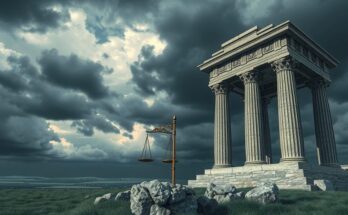M23 rebels in the Democratic Republic of Congo are increasingly controlling mineral-rich areas, allegedly with Rwandan support. A UN report reveals the establishment of shadow government structures by the M23 to exploit mining resources, particularly coltan, generating substantial revenue. Additionally, the ongoing violence has displaced over 100,000 people, compounding the humanitarian crisis. Meanwhile, protests highlight concerns over illegal mining, particularly by Chinese firms, suggesting a greater need for accountability and governance in the resource sector.
Recent developments in the eastern Democratic Republic of Congo (DRC) indicate that M23 rebels are solidifying their control over mineral-rich regions, according to a report released by the United Nations experts. Active since April 2024, these Tutsi-led rebels have captured significant towns in North and South Kivu provinces, allegedly receiving backing from Rwandan forces—a claim Kigali disputes while maintaining a stance on a ceasefire and peace negotiations.
The UN report details how the M23 has established shadow governing bodies to exploit strategic mineral resources and trade routes. Its activities signify a substantial disruption in supply chains involving conflict minerals over the past decade. The Group of Experts emphasized the unlawful extraction of minerals, notably coltan, which is crucial for electronic devices, including smartphones and computers. By operating a so-called “mining ministry,” the M23 has managed to collect considerable revenue through taxation on coltan in Rubaya, reported to be $800,000 per month.
Despite the ongoing ceasefire agreements, the M23’s campaign appears to reflect intentions for long-term occupation and exploitation of the territories. The UN expressed concern regarding the influence of these actions on multinational electronics firms, which face increasing pressure to ensure that their supply chains remain conflict-free. In light of these tensions, a legal case has been initiated by the DRC against Apple in France and Belgium, alleging the use of conflict minerals in its supply chain, which Apple has contested by asserting its sourcing policies.
The resurgence of violence has led to the displacement of more than 100,000 individuals in North Kivu since the start of 2025, reflecting an escalating humanitarian crisis that compounds the existing dislocation following the M23’s resurgence in 2021. Civil demonstrations have erupted in Bukavu, South Kivu, against illegal mining activities driven largely by Chinese companies, which have reportedly operated without proper permits and have engaged in illicit practices. Local voices are urging that the region’s minerals benefit community development rather than exploitation.
The situation in Eastern DRC is marked by a complex interplay of armed conflict, resource exploitation, and international implications. The M23’s resurgence and territorial control have triggered a humanitarian crisis and raised significant international concerns regarding conflict minerals. The DRC is one of the world’s richest nations in minerals, yet it struggles with governance and stability, leading to widespread illegal mining and exploitation by various actors, including foreign companies, particularly from China. The involvement of external nation-states and the harsh realities faced by local communities continue to magnify the region’s challenges, particularly with regards to international laws that aim to mitigate conflict mineral trade.
In summary, the grip that M23 rebels are tightening on mineral resources in the DRC not only endangers regional stability but also impacts global supply chains, particularly within the electronics industry. Continued illegal mining and forced labor practices threaten the livelihoods of Congolese communities while undermining international efforts to establish conflict-free sourcing. The current humanitarian crisis and ongoing civil unrest further complicate the situation, necessitating urgent international attention and interventions to restore peace and protect the rights of affected populations.
Original Source: www.rfi.fr




